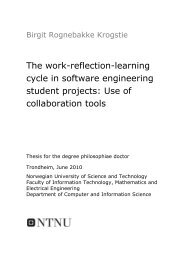Disputation Mikhail Fominykh - Department of Computer and ...
Disputation Mikhail Fominykh - Department of Computer and ...
Disputation Mikhail Fominykh - Department of Computer and ...
Create successful ePaper yourself
Turn your PDF publications into a flip-book with our unique Google optimized e-Paper software.
Introduction<br />
Chapter 3 describes the research context <strong>and</strong> research design <strong>of</strong> the PhD<br />
work.<br />
Chapter 4 presents the results <strong>of</strong> the research work.<br />
Chapter 5 provides evaluation <strong>and</strong> discussion <strong>of</strong> results.<br />
Chapter 6 concludes the thesis <strong>and</strong> outlines directions for future research.<br />
Part II contains the primary research papers which are numbered in the order <strong>of</strong><br />
conducted research activities that they present. The relations between the topics,<br />
research questions, contributions, <strong>and</strong> papers are presented in Table 1. Papers<br />
marked with bold answer the corresponding research questions <strong>and</strong> provide the<br />
main contributions.<br />
Paper 1 provides guidelines for designing an educational virtual city.<br />
Paper 2 provides guidelines for integrating a virtual campus <strong>and</strong> a virtual<br />
city.<br />
Paper 3 provides implications for designing the virtual campus <strong>of</strong> NTNU.<br />
Paper 4 provides an overview <strong>and</strong> implications for the use <strong>of</strong> collaborative<br />
work on 3D content in educational settings.<br />
Paper 5 provides a proposal for the integration <strong>of</strong> cultural, social,<br />
educational, <strong>and</strong> entertainment aspects <strong>of</strong> learning communities with the<br />
‘Universcity’ framework.<br />
Paper 6 provides a proposal <strong>and</strong> an evaluation <strong>of</strong> the Virtual Research Arena<br />
framework.<br />
Paper 7 provides a proposal <strong>and</strong> evaluation <strong>of</strong> the Typology <strong>of</strong> 3D Content<br />
<strong>and</strong> Visualization Means. In addition, the paper contains a methodology for<br />
learning with educational visualizations in 3D CVEs.<br />
Paper 8 provides implications for supporting learning communities in 3D<br />
CVEs.<br />
Paper 9 provides requirements for creativity support in an educational 3D<br />
CVE.<br />
Table 1: Relations <strong>of</strong> topics, research questions, contributions, <strong>and</strong> papers<br />
Research topics Research questions Contributions Related papers<br />
Collaborative work<br />
on 3D content<br />
Design <strong>of</strong> tools <strong>and</strong><br />
environments<br />
Support <strong>of</strong> learning<br />
communities<br />
RQ1<br />
RQ2<br />
RQ3<br />
RQ1a C1: Typology P4, P7<br />
RQ1b C2: Methodology P3, P7, P9<br />
RQ2a C3: Tools / CVW P3, P6<br />
RQ2b C4: Environments P1, P2, P5, P9<br />
RQ3a C5: VRA P5, P6, P8, P9<br />
RQ3b C6: ‘Universcity’ P1, P2, P5<br />
9
















